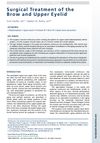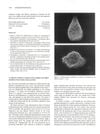 1 citations,
June 2022 in “Chinese medical journal/Chinese Medical Journal”
1 citations,
June 2022 in “Chinese medical journal/Chinese Medical Journal” Two new mutations in the CDH3 gene cause hair loss and vision problems in a young girl.
 1 citations,
January 2022 in “Stem cell biology and regenerative medicine”
1 citations,
January 2022 in “Stem cell biology and regenerative medicine” New methods to test hair growth treatments have been developed.
 1 citations,
August 2021 in “Педиатр”
1 citations,
August 2021 in “Педиатр” Endocrine diseases in children often cause skin changes like dryness, redness, acne, hair loss, and more.
[object Object] 
Tumid lupus erythematosus can cause non-scarring hair loss on the scalp and requires careful diagnosis.
January 2025 in “Anais Brasileiros de Dermatologia” Male pattern baldness worsens with age and can be treated with medications like minoxidil and finasteride, but side effects and personalized care are important.
 July 2024 in “Journal of Investigative Dermatology”
July 2024 in “Journal of Investigative Dermatology” A single medium, PRIME AIRLIFT, supports better human hair follicle formation in grafts.
January 2024 in “Diagnostics” Long COVID causes a wide range of long-lasting symptoms that change over time and are hard to diagnose and treat.
January 2022 in “JAAD case reports” Granulomatous alopecia areata is a rare but real form of hair loss.
 40 citations,
March 2017 in “The journal of investigative dermatology/Journal of investigative dermatology”
40 citations,
March 2017 in “The journal of investigative dermatology/Journal of investigative dermatology” Growing hair follicles have high mitochondrial activity and ROS in specific regions, aiding hair formation.
 October 2023 in “Apollo medicine”
October 2023 in “Apollo medicine” The skin acts like an endocrine organ, producing hormones that affect various body functions and skin health, and understanding this can lead to new treatments.
 1 citations,
October 2018 in “Operative techniques in otolaryngology--head and neck surgery”
1 citations,
October 2018 in “Operative techniques in otolaryngology--head and neck surgery” New techniques can effectively treat aging around the eyes.
 24 citations,
January 2020 in “International Journal of Molecular Sciences”
24 citations,
January 2020 in “International Journal of Molecular Sciences” Some plants with flavonoids may help treat hair loss and promote hair growth.
 39 citations,
October 2018 in “Aesthetic surgery journal”
39 citations,
October 2018 in “Aesthetic surgery journal” Injectables can feminize or masculinize a transgender person's face, but more research is needed for best practices.
 36 citations,
April 2017 in “journal of current ophthalmology”
36 citations,
April 2017 in “journal of current ophthalmology” Good preoperative assessment is crucial for safe and effective eyelid and brow cosmetic surgery.
 14 citations,
March 2015 in “Facial plastic surgery clinics of North America”
14 citations,
March 2015 in “Facial plastic surgery clinics of North America” Individualized assessment and meticulous planning are crucial for successful brow and upper eyelid surgery.
 2 citations,
January 2018 in “European journal of pediatric surgery reports”
2 citations,
January 2018 in “European journal of pediatric surgery reports” A baby girl's hair turned straight on one side due to a neck tumor and surgery, but it returned to curly as she recovered.
 1 citations,
June 2010 in “Mayo Clinic Proceedings”
1 citations,
June 2010 in “Mayo Clinic Proceedings” The conclusion is that individualized treatment and proper medication use are crucial in men's health, with specific recommendations for ED, BPH, and prostate cancer management.
 August 2016 in “InTech eBooks”
August 2016 in “InTech eBooks” Esthetic surgery complications can include infections, nerve injury, and more; proper evaluation and technique help prevent them.
 4 citations,
September 2016 in “PubMed”
4 citations,
September 2016 in “PubMed” Using platelet-rich fibrin matrix with hair transplant techniques helps in hair regrowth in male baldness patients.
9 citations,
June 2017 in “American journal of ophthalmology. Case reports” A new mutation in the CDH3 gene causes hair loss and vision problems in a young girl.
 4 citations,
February 2021 in “International Journal of Women's Dermatology”
4 citations,
February 2021 in “International Journal of Women's Dermatology” Trichoscopy is a quick and reliable way to diagnose hair loss in women.
11 citations,
October 1997 in “British Journal of Dermatology” Wool follicles grew fibres for 8-10 days in a serum-free culture, influenced by calcium, glucose, amino acids, and insulin.
 December 2022 in “Cureus”
December 2022 in “Cureus” Hormones significantly influence hair growth, with conditions like hirsutism and patterned hair loss linked to hormone levels; more research is needed for full understanding.
[object Object] 102 citations,
July 2020 in “International journal of molecular sciences” Hormones like testosterone and estrogen significantly affect hair growth and structure.
 122 citations,
November 2010 in “Journal of Dermatological Science”
122 citations,
November 2010 in “Journal of Dermatological Science” Male pattern baldness involves hormones and cell signals affecting hair growth.
 115 citations,
August 2008 in “The Journal of Clinical Endocrinology & Metabolism”
115 citations,
August 2008 in “The Journal of Clinical Endocrinology & Metabolism” Thyroid hormones help hair grow, reduce hair loss, and increase hair pigment.
 44 citations,
July 2011 in “Dermato-endocrinology”
44 citations,
July 2011 in “Dermato-endocrinology” Thyroid hormone affects skin health, with too little causing rough, pale skin and too much leading to smooth, thin skin, and may also impact wound healing and skin conditions.
 24 citations,
July 2011 in “PubMed”
24 citations,
July 2011 in “PubMed” Thyroid hormones affect skin texture, hair and nail growth, and can cause skin diseases related to thyroid problems.
 8 citations,
September 1993 in “British journal of dermatology/British journal of dermatology, Supplement”
8 citations,
September 1993 in “British journal of dermatology/British journal of dermatology, Supplement” A new method helps isolate key hair components to study hair growth and loss.
 January 2008 in “Springer eBooks”
January 2008 in “Springer eBooks” Thyroid hormone may be useful for treating various skin conditions and needs more research.
























